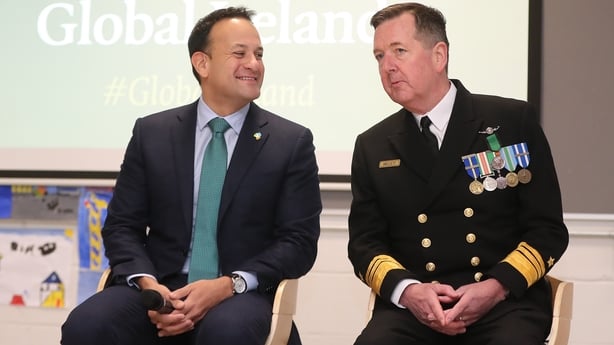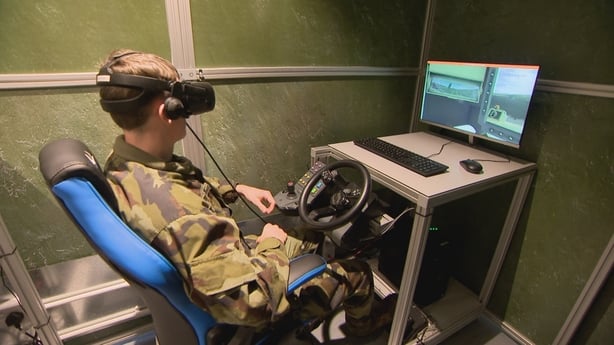A former chief of staff of the Defence Forces has told Prime Time that "neutrality as a statement in a globalised world is a myth."
Retired Vice Admiral Mark Mellett also said Russia’s involvement in the 2021 cyberattack on the Health Service Executive is "undeniable."
Mr Mellett served as head of the Defence Forces and the Government’s principal military adviser from 2015 to 2021, during which time he was also a member of the EU Military Committee.
He says to date there has been a reluctance in Ireland to develop our defence capabilities in partnership with other states "because of our interpretation of being militarily non-aligned."
"I don't believe we are a neutral state. We are militarily non-aligned and, while defence remains a sovereign competence, that doesn't mean that you don't collaborate and work with partners in terms of how you develop your capabilities. You cannot develop military capabilities in a silo," he said.
Mr Mellett was speaking during an interview for a Prime Time report on Ireland’s security and defence capabilities, his first television interview since retirement.
He is calling for closer bilateral co-operation between the Irish Defence Forces and others, such as the British and French.
"You need to have a commitment across a broad spectrum of capabilities that you can work together. There's so much more to this than just saying we're militarily non-aligned. You have to be able to work with others to deliver defence capabilities in today's world," he said.

Mr Mellett’s comments come as EU leaders meet in Brussels to discuss EU defence issues, following recent major shifts in US foreign policy towards Ukraine and Europe under President Donald Trump.
"Europe is now moving to a point whereby it has made this declaration of the need for strategic autonomy. We're in the context of a changed security environment, Europe needs to collaborate together better," Mr Mellett said.
"Up to this point, Europe, has not had the capabilities nor has it had the actual culture to be involved in defence and security. To some degree, it subcontracted this to NATO," he added.
Ireland needs to play "a meaningful role" in any changes in Europe, according to Mr Mellett, who welcomed recent government announcements to increase defence spending.
Ireland currently spends 0.2% of GDP on defence, the lowest in Europe. In 2024, the EU spent 1.9% of EU GDP on defence, according to EU data.
We need your consent to load this flourish contentWe use flourish to manage extra content that can set cookies on your device and collect data about your activity. Please review their details and accept them to load the content.Manage Preferences
A 2022 Commission on the Defence Forces examined the potential impact of an increase in defence spending, and its impact on Irish military capabilities.
It categorised our current capability as being at ‘Level of Ambition 1,’ (LOA1) which "aims to uphold sovereign rights and serve on peace support operations."
Tánaiste Simon Harris has recently outlined that with a change in defence spending - a record funding allocation of €1.35 billion this year, increasing to €1.5bn by 2028 - will increase Irish military capabilities towards ‘Level of Ambition 2.’
In coming years, the Tánaiste stated "reaching Level of Ambition 3 is where we need to get to in the years ahead."
Bringing the Irish military to LOA3 would see it have "full spectrum defence capabilities to protect Ireland and its people to an extent comparable to similar sized countries in Europe."
It would require further additional spending. Such government spending commitments are long overdue, according to Mr Mellett.
"To be in a position not just to uphold our sovereignty, but to act within a multilateral framework of the EU. For most normal states, investment in defence is like paying your insurance premium," he said.

Subsea cables and Russian threat
Mr Mellett, whose career background is with the Naval Service, says one of Ireland’s key defence weaknesses is in the protection of our sovereign waters, and what he calls our "sea blindness."
"We currently don't have a primary radar capacity to see activity off to the west coast. And that's an exposure not just for Ireland, but for our neighbours and our EU partners."
He warned of the threat of Russian vessels entering Irish waters for surveillance of subsea cables, noting our economy is reliant on tech companies, that our energy links to the UK are also subsea.
"Our State security is inextricably linked with economic security, which is inextricably linked with energy security," he said.
Mr Mellet says that he believes that a series of recent "strategic shocks" should have been a wake-up call for Ireland.
He says the first major one was the cyberattack on the HSE network in 2021.
"By any measure, that was a strategic shock. It was a cyberattack on an institution of this State that had extraordinary implications. And that cyberattack came from actors within the Russian Federation," he said.
"Indeed, the actual key to unlock that came from [Sergei] Lavrov [the Russian foreign minister] after his intervention on the basis of a call from [then] minister [Simon] Coveney. Russian Federation involvement in that, is in my view, undeniable," he added.
Another "outrageous" example, according to Mr Mellett, came in January 2022 when the Russian embassy notified the Irish government of their intention to carry out military exercises in our economic zone for five days.
"I have never come across such an arrogance in international law. There was a sense that we didn't have the capabilities to push back on it."
Russian vessels eventually left the area, deterred in part by the refusal of local fishermen to move.
Mr Mellett believes the benefits will outweigh the cost of investment.
"Without US support, that means we might have to spend three cups of coffee instead of one per day, in supporting the war in Ukraine. It's not a huge price. It's not just about territory. It's about values that we have in the European Union."
A report by Oonagh Smyth and Aaron Heffernan on Ireland's defence and security is included in the 6 March edition of Prime Time, at 9.35pm on RTÉ One television and RTÉ Player.






